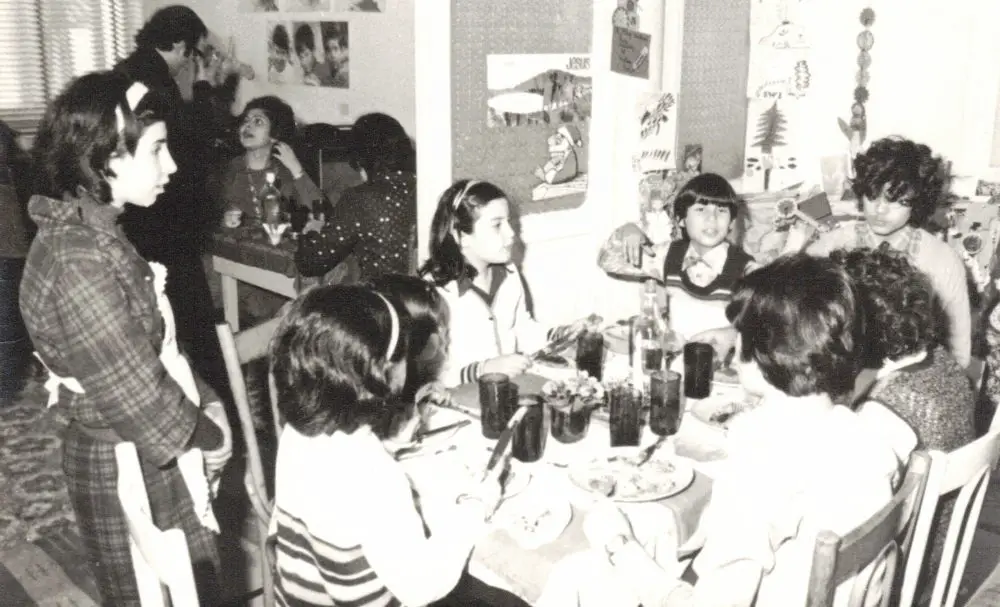
The picture above was taken January 1, 1975. I know this because my father, a photographer, was in the habit of stamping the date on the back of his hard copies, signing his name and including a cataloguing reference I never understood. You can barely see the elaborate crèche he built behind the kids’ table. I am sitting to the right of my cousin Danielle, to the left of my older brother Gabriel, with a white paper sheet with the word “PRESS” on my vest: even then, whoring for the profession (another picture shows me taking pictures and my cousin Philippe recording an interview of the guests).
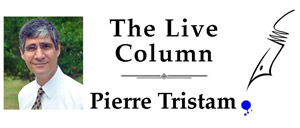 To the very left is Selma, our maid at the time, from Syria, a sweet creature vaguely suspect my parents abused and paid dirt wages, as Lebanese bourgeois families tended to do with “the help,” though my parents forbade us children from ever being served by the help. We had to be our own help, and if we ever spoke the wrong way to her the wrath of dad would be upon us, so maybe they weren’t so abusive of her after all.
To the very left is Selma, our maid at the time, from Syria, a sweet creature vaguely suspect my parents abused and paid dirt wages, as Lebanese bourgeois families tended to do with “the help,” though my parents forbade us children from ever being served by the help. We had to be our own help, and if we ever spoke the wrong way to her the wrath of dad would be upon us, so maybe they weren’t so abusive of her after all.
In the distance are my aunt and uncle, Renee and Andre, who are still alive and living in Paris, like Jacques Brel, bless their hearts, as are their daughters, Michelle and Nicole, who in the picture are sitting at the children’s table with me but in life have been ensconced in the Emirates, living that good life, for many years, last I knew. We have not stayed in touch as cousins should. As for Selma, who was barely older than me at the time–for all their Sunday Christianity and supposed liberalism, the Lebanese seemed to have no qualms about child labor–I can only hope she has survived the years of devastation in her own country, assuming she made it back.
My father never appears in this set of pictures: he was clicking away behind the camera. Three month and 13 days after that picture was taken–after that wonderful New Year’s feast when we thought the wonders could never cease–April 13, 1975 happened, and our sumptuous self-indulgence, our nation, our lives broke. The country went to war and didn’t stop for the next 15 years, and even then, I’m not sure it has. I eventually escaped, though the more I age, the less those buffers I created with a past too wonderful to bear, because it is irrecoverable, and too crushing to remember, because the distance is so imaginary, seem to be effective anymore. It is in the ordinary of a Palm Coast evening, of a string of Christmas lights or a friend’s picture of a manger, that the illusion of that insulating membrane gives way.
I imagine I’m like anyone else: I don’t like taking down Christmas lights, which I have timed to go off at night but come back on before dawn, so I can see them when I get up for a little quiet meditation between hard covers and before the workday begins, and so they can be on when Cheryl leaves for work. Nor do I like taking down the Christmas tree, tiny though it’s become over the years: Christmas trees diminish in size and garlands in proportion to our years. Real trees accumulate rings. Fake Christmas trees shed them.
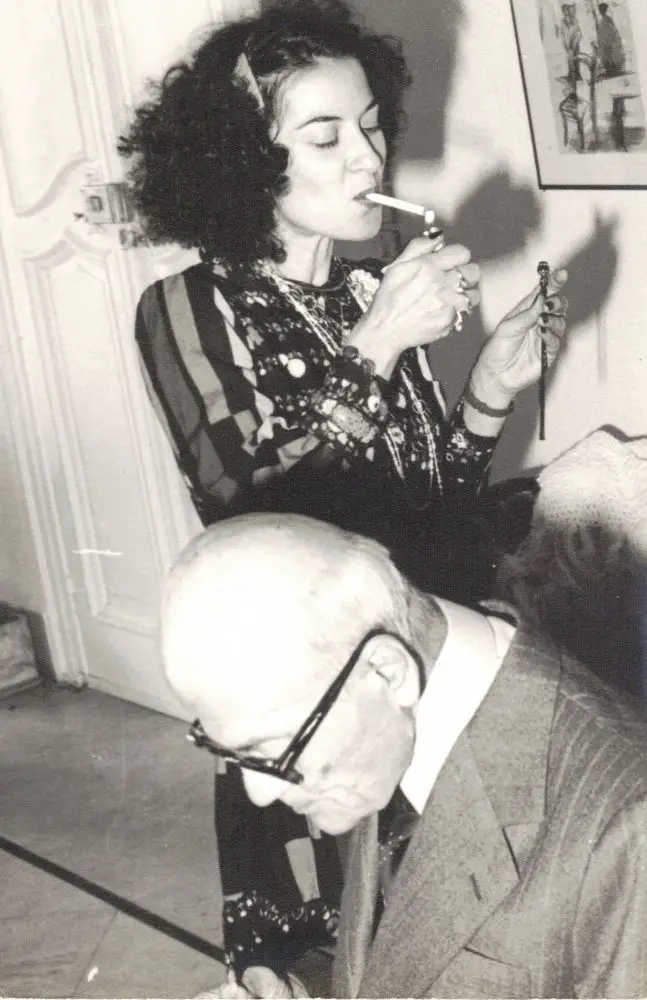
I say this never having known a real sap-rich and needle-drizzling Christmas tree in the house. Even in Lebanon–especially in Lebanon, whose slopes so full of cedars, the original Christmas trees, were razed eons ago to build Phoenician ships and Jewish temples–we always had the PCV-rich plastic kind, recycled year after year until it lost too much gloss and toxicity to keep upright.
Still: taking it all down, packing it up, all with the advent of a new year, is like a ritual acknowledgment of another year lost and fewer years left to garland, hopefully with as little misery as possible, though 2024 comes with a bright red disclaimer: we already know that it is going to be a difficult one, especially on November 5, when MAGA’s boiling-over Godfreys reclaim their Jerusalem. I’m guessing next Christmas will for some of us be more Golgotha than Bethlehem, and for some way more triumphal than the Second Coming could ever be.
So there’s something extra clingy about this year’s lights. I won’t be removing the lights or the tree until after Jan. 6–not because of that date’s infamy on the American calendar, but because in my family calendar again going back to Beirut–as everything always seems to in the end–Jan. 6 was a feast day: we took Epiphany seriously. It was the day when we’d finally put the three magi in the manger, after their arrival from the East, and when we’d ask for the millionth time: what the hell is myrrh? I still don’t know, but I expect Mary and Joseph appreciated it more than fruitcake.
My parents were both minor celebrities. My father had finally gotten his photography business going, the newspapers were taking notice, he had his gallery openings, he was sought after enough that his insecurities had calmed a little, even if his chain-smoking Gitanes had not. My mother hosted a TV show for kids, had a newspaper column, had a radio variety show on and off, and she loved to entertain. They both did. When our parents weren’t out, which was every other night, evenings at our house were a Cleveland of second-hand smoke and flameless Cuyahogas of booze. She always had a big invite either on Jan. 1 or on Epiphany, this one reserved for our extended families. There was less drinking and more children.
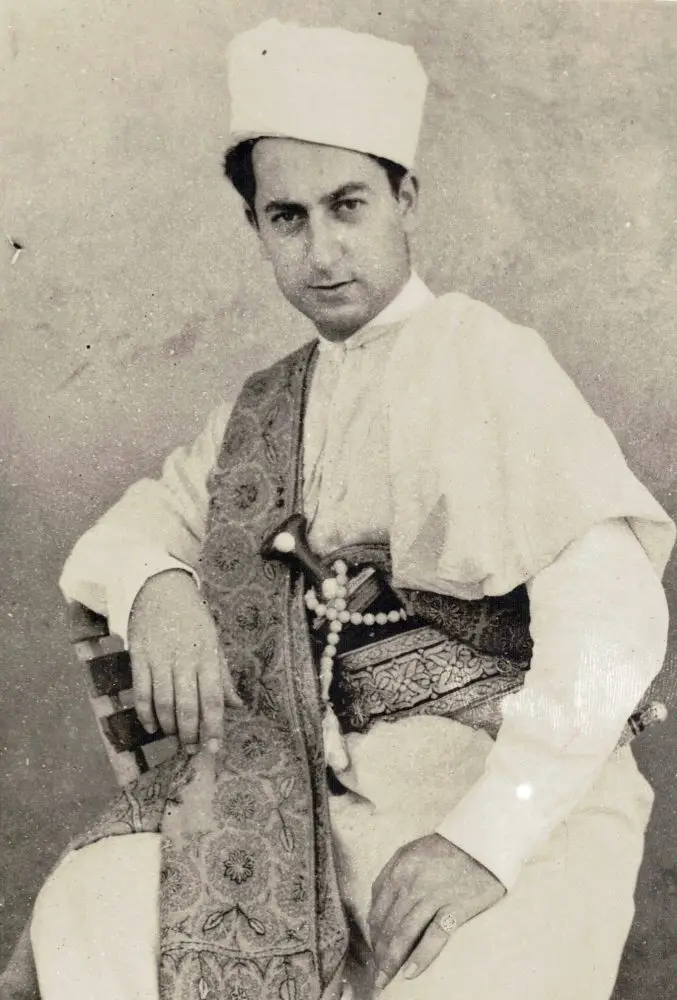
The highlight was the big cake and the mystery bean tucked in there. Whoever got the bean was the king or queen, and got to choose his or her king or queen. It being Beirut in the 1970s, we were yet to have the guile, the imagination, the love, to have two kings, or two queens. The dull heterosexuality of it was assured, but I was also at an age, and in a culture, when boys my age were so sheltered, so oppressively, so regressively Catholic, that I had no idea there was such a thing as homosexuality, or maybe even sexuality tout court. No wonder it was a virgin birth.
Speaking of which: I remember (and preferred) the crèche much better than the Christmas tree. It was an enormous crèche. My dear father Fouad would build it every year out of planks of wood, hammering away for what seemed like an eternity in a corner between the dining room and the larger living room (we had two living rooms in a seven-bedroom, third-floor apartment in those days of careless glory).
Every year his creation was different. He left it to my mother to cover the frame in brown and Jackson-Pollocked papier mâché that had a peculiar smell, and her Byzantine decorations that seemed to recap our entire year in celebrations and strings of lights. They both left it to me and my two brothers to people the crèche with Mary and Joseph and the little muttons, and whatever errant characters we could find to harass the poor couple. I remember one especially, a suspiciously European-looking fellow with a sheep on his back: I was too innocent to know yet that it was the universal posture of a man ready to slaughter the poor thing (Mary and Joseph had to eat, didn’t they?), too blessedly ignorant to know that it was the lull before a greater slaughter.
I loved seeing the empty crib the days before Christmas, then waking up on Christmas day and seeing Jesus there, eyes ablaze, tiny legs as if kicking the air or, as I would later assume more correctly, God, as Jesus thought, of all gin joints…. But he was a sacred little thing. I’m not sure I allowed myself to touch him, or even wondered how on earth he appeared this way overnight: it’s not like my father had had his talk with me about the birds and the bees yet, in that seafood restaurant overlooking the Mediterranean near Byblos. Mary, bent over the crib, looked no different in her graceful immobility.
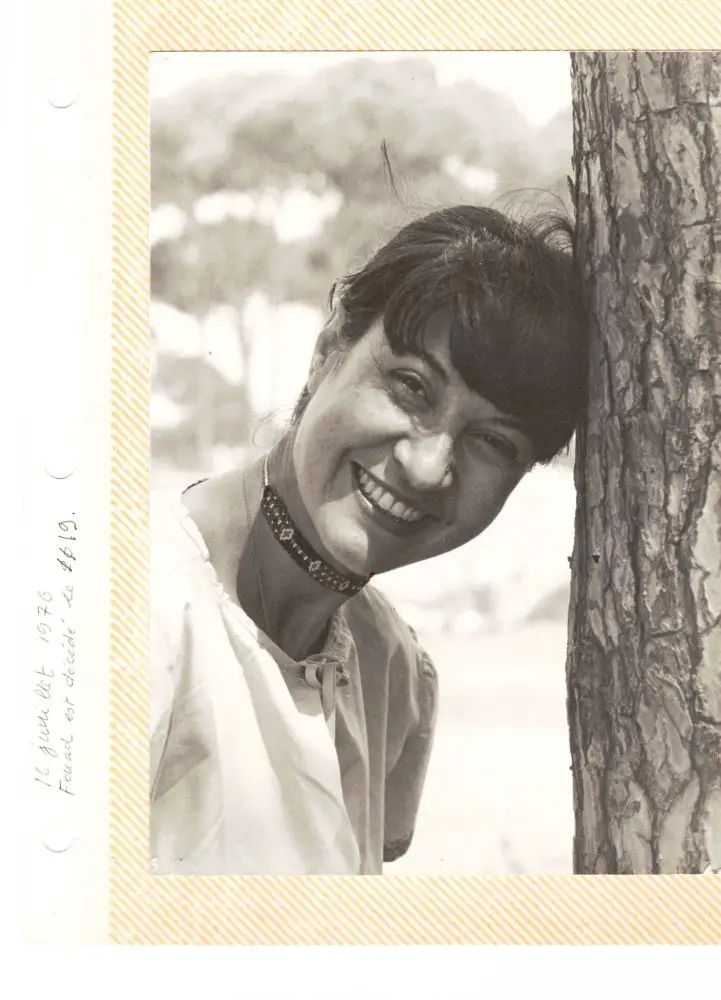
It was by the crèche, not the tree, that we’d lay out our shoes the night before, so Papa Noel would know where to drop whose gifts. Christmas morning would finally toll. After that we were too absorbed by our toys to give Mary and Joseph or even Jesus another thought: they fled to Egypt not because Herod was coming for them–unlike Hamas, Romans could care less what Jews did as long as they paid their taxes and kept out of the way–but because we abandoned them.
As the damp, cold Beirut January would roll around, the crèche would be dismantled, maybe while we were at school, and we’d be terribly sad, but not too sad, because we had a good life: I recall my parents tended to fight a bit at times–they were passionately Mediterranean at heart–but they loved life as much as they loved each other, they reveled in their theatrical side, driven by an artistry as undisciplined as it was unsatisfied, and on the whole we seemed to be insistently happy. So of course it couldn’t last, and it didn’t.
I was 10 when the war started. My father never built another crèche. In late spring, after three heavy rounds of fighting, one of which sent rockets blasting into our neighbors’ apartment the floor below us, we relocated to our safer mountain home. His photography business literally in pieces–I recall a picture he took of one of the glass tables in his studio, upside down, glass shards like petals around it: bomb concussions could do wonders–my father the next winter left the country to look for work.
He died six months before the Christmas of 1977, seven days after returning from a half-year trip to the United States and Europe, still jobless. His arteries were thicker, his tree rings thinner, than we knew. Come to think of it, these lights, that tree that I don’t want to remove: maybe they’re a buffer to memories that break me when I recall them, as they do now as I write about them, though I am just as grateful they break me still, like an unexpected gift across a chasm of years.
![]()
Pierre Tristam is FlaglerLive’s editor.
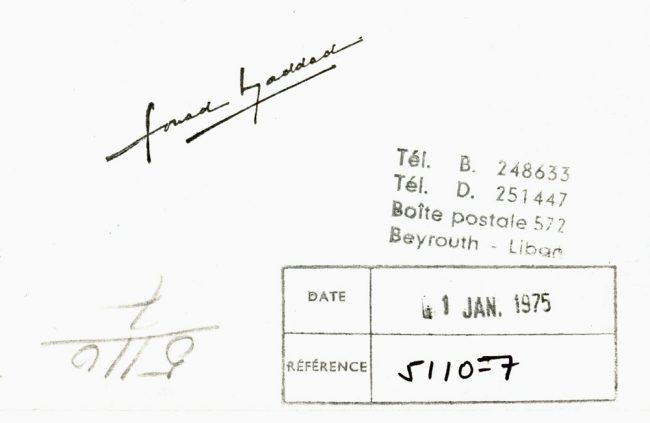





























Janet Sullivan says
I understand the conflict in sadness. Today is my mother’s birthday. I usually speed through my days, but on her birthday I try to take it slow and do a couple of things I know she would enjoy doing. I welcome the sadness that accompanies this day and sit in it for a while to honor the memories and her love. Thank you for your writing, and your sharing.
Nancy Skadden says
I always appreciate your personal stories, Pierre, especially about your childhood. You enhance my knowledge of the Middle East, an understanding I never got in college.
By the time I take down my Christmas decorations/tree mid to late January, I’m ready for a change so I avoid the sadness that comes with Dec. 26th. My own father died days before Christmas when I was a skinny 13 year old girl. Time passed.
Happy New Year and thanks for another year of splendid local and world reporting.
hippy says
Thank you again for sharing. I love these stories you share of your life growing up. However even with this beautiful story, you cannot help yourself and through in your disdain for those who have a different political persuasion than you. Can’t you just once, in something you write just leave it out?
Ray W. says
I am not convinced from reading years of articles written by Mr. Tristam that he has “disdain” for all who present comments from a political persuasion that differs from his own. Is it possible that Mr. Tristam greatly respects the “virtuous” partisan member of faction, regardless of the faction? That he disdains only those who present comments from the perspective of a “pestilential” partisan member of faction? There is a great difference between the two mindsets.
Once again, in his final paragraph of Federalist Paper #37, James Madison clearly expression his respect and admiration for those attendees to the Constitution who were able to set party differences aside during the debates that framed the making of our Constitution; they, according to Madison, were the ones who made the proposed Constitution possible. Madison distinguishes them from the far more common “pestilential” partisan members of faction who, according to Madison, posed a great domestic threat to the novel idea of a liberal democratic Constitutional republic.
For my part, I argue that David Brooks, the excellent New York Times editorialist, and a true conservative voice today, is far different from the Flagler County Republican politician who took to the local radio some three years ago to ask just when would it become time to begin beheading Democrats. Do you, hippy, disagree with my argument? Do you express disdain for that most scurrilous of local Republican politicians? If not, why not?
Keenan says
Indeed, a wonderful story. Pierre, I enjoyed the story because we have very similar upbringings. My father was Syrian. We traveled all over the Middle East and lived in Kuwait for a couple of years. My father was born on December 29 so the holidays are mixed emotionally. I’ve weighed in, a few times on stories based on Gaza. Oddly enough as harrowing as the subject matter was, somehow writing in the comment section, I felt closer to my father. Your writing obviously brings you pride, but know that it reminds me of who I am and it brings me pride to thank you so much.
Ann Marie says
I hope you will continue writing stories about your life.
Pierre Tristam says
A few days after writing this I came across this line by Henry James, in “Gabrielle de Bergerac”: “It was one of those long raptures of childhood which seem to imprint upon the mind an ineffaceable stain of light.”